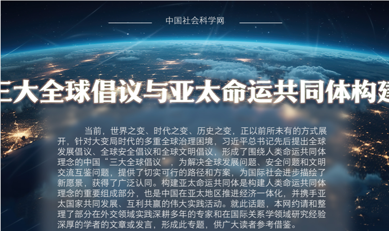Recently, the Chinese Social Sciences Net (CSSN) published a dedicated webpage to cover the symposium on “Three Global Initiatives and the Construction of an Asia-Pacific Community with a Shared Future”, held at JSU.
On April 20, the symposium was held in Zhenjiang, Jiangsu Province, organized by JSU and co-hosted by the Jiangsu Research Center for Xi Jinping Thought on Socialism with Chinese Characteristics for a New Era, the Global Development and Security Research Institute of JSU, and the Shanghai Institute of American Studies. The event gathered numerous experts and scholars from across the country and attracted significant media attention, generating notable social impact.
The CSSN webpage features 10 sections summarizing the key speeches delivered by participating experts and scholars.

Xu Bu, Director of Jiangsu University’s Global Development and Security Research Institute, delivered a speech focused on “Implementing the Global Security Initiative to Promote World Peace and Development”. He noted that President Xi Jinping’s proposal of global security initiative reflects a deep concern for global peace and the welfare of people worldwide, while leading the trend of progress and development in the current era and providing a clear path toward lasting peace and universal security. Xu described this as a demonstration of exceptional theoretical courage and profound global vision.

Shi Zhongjun, Secretary-General of the China-ASEAN Center, highlighted ASEAN as a practical site for implementing the “Three Global Initiatives” and building an Asia-Pacific Community with a Shared Future. He stressed that China and ASEAN are steadfast defenders of regional peace and stability, cooperative partners overcoming geographic divides, and dedicated practitioners of cultural exchange and mutual learning.

Zhou Hanmin, a member of the Standing Committee of the 14th National Committee of the Chinese People’s Political Consultative Conference (CPPCC) and President of the Shanghai Public Diplomacy Association, emphasized that China’s principles of “consultation, joint contribution, and shared benefits” have been incorporated into resolutions adopted at meetings such as the United Nations Security Council and other specialized UN conferences, marking a new contribution to international law.

Liu Wei, Deputy Director-General of the Policy Planning Department of the Ministry of Foreign Affairs, offered specific recommendations to leading experts and scholars in international relations and regional and international studies, emphasizing the need to deepen theoretical research, actively provide policy advice, and strengthen international communication.

Yang Jiemian, Chair of the Academic Advisory Committee at the Shanghai Institutes for International Studies, delivered a keynote speech on the logical relationship and historical synergy between the “Three Global Initiatives” and the Asia-Pacific Community with a Shared Future. He described the initiatives as an interconnected and interdependent whole, representing contemporary international society’s latest practical exploration and theoretical innovation in addressing challenges and advancing reforms. He further noted that these initiatives will continue to deepen and expand with the progression of history and changes in the times.

Professor Jia Qingguo, a Standing Committee member of the 14th CPPCC and Director of the Base for International People-to-People Exchanges under the Ministry of Education, analyzed the historical reasons for U.S.-China confrontations, the causes for recent easing of tensions, and predicted the future trajectory of U.S.-China relations in his keynote speech.

Zhu Feng, Dean of the School of International Relations at Nanjing University and Executive Director of the Collaborative Innovation Center of South China Sea Studies, pointed out the severe and complex geopolitical and geostrategic environment, providing an analysis from four perspectives.

Liu Feng, Professor at Tsinghua University’s Department of International Relations and Editor-in-Chief of The China Journal of International Politics, stressed during a roundtable discussion that building a community requires adhering to true multilateralism and an open regionalism.

Xing Liju, Professor at Fudan University’s Institute of International Studies and Vice President of the Shanghai Korean Peninsula Research Society, stated that the Global Civilization Initiative aims to promote coexistence and mutual learning among civilizations. She emphasized its irreplaceable role in advancing human modernization and fostering global peace and development.

Chen Jiajun, Deputy Director of the Research Office at the Shanghai Institute of American Studies, pointed out that for the “Three Global Initiatives” to be effectively implemented, attention must be paid to U.S. actions and the genuine interests and needs of Pacific Island nations.

https://www.cssn.cn/ztzl/yyxc/sdqqcy/
